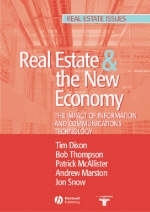
Real Estate and the New Economy
Blackwell Publishing Ltd (Verlag)
978-1-4051-1778-4 (ISBN)
- Titel ist leider vergriffen;
keine Neuauflage - Artikel merken
Tim Dixon is Director of the Oxford Institute of Sustainable Development and Professor of Real Estate in the Department of Real Estate and Construction at Oxford Brookes University. With more than 25 years' experience of research, education and professional practice in the built environment he is a qualified fellow of the RICS and of the Higher Education Academy, a member of SEEDA's South East Excellence Advisory Board, as well as the editorial boards of five leading international real estate journals. He has worked on funded collaborative research projects with UK and overseas academics and practitioners and his personal research interests revolve around the sustainability agenda and its impact on property development, investment and occupation, and the impact of ICT on commercial property and real estate markets. The research is based on a strong interdisciplinary approach which incorporates policy and practice impacts, and futures thinking. He is also a member of the CORENET Sustainability Working Group, and a member of the Steering Group for the 'Future of Cities' Research programme, based in the James Martin 21st Century School at Oxford University. In 2009 he was awarded Honorary Fellow status of the Institute of Green Professionals.
The Authors. Foreword by Paul McNamara, Prudential Property. Investment Managers. Preface. Table of Responsibilities. Introduction. 1.1 Background. 1.2 Aim and objectives. 1.3 Definitions. 1.4 Technological change; alternative perspectives. 1.5 Summary - an overview. 1.6 An integrative socio-technical framework for ICT and real estate. 1.7 Examples of the socio-technical approach. 1.8 Key themes of the book. Section 1 Context and Framework. 2. The Social, Economics and Political Context of ICT Transformation. 2.1 Introduction. 2.2 Understanding the role of technological change in society. 2.3 Towards an information society and the new economy. 2.4 The role of knowledge and innovation in policy. 2.5 Information society policy development in the UK. 2.6 Measuring the information society. 2.7 Implications of the development of an information society. 2.8 Summary. 3.Technological Change: Diffusion and Adoption of ICT by Consumers, Businesses and Governments. 3.1 Introduction. 3.2 Technology diffusion. 3.3 Implications of ICT diffusion for consumers, businesses and government. 3.4 Internet-driven activities: eBusiness, eCommerce and eWork. 3.5 Some implications of ICT adoption for real estate. 3.6 Summary. 4. Business Process and Organisational Change. 4.1 Introduction. 4.2 Understanding corporate change. 4.3 ICT and the design of organisations. 4.4 Generic business processes. 4.5 Procurement. 4.6 Operational management. 4.7 Marketing. 4.8 Customer relationship management. 4.9 Accounting. 4.10 Recruitment. 4.11 Stock management. 4.12 Financial management. 4.13 Mapping processes to property. 4.14 Summary. 5. The New Economy and Real Estate. 5.1 Introduction. 5.2 What is the new economy. 5.3 The evidence for a new economy. 5.4 The role of real estate in the new economy. 5.5 Summary. Section 2 Real Estate Spaces and the Impact of ICT. 6. Real Estate Spaces. 6.1 Introduction. 6.2 The paradox of location in the new economy. 6.3 Physical form and virtual reality. 6.4 Transactions in space. 6.5 Personal space. 6.6 Private space. 6.7 Summary. 7. Real Estate Use and ICT. 7.1 Introduction. 7.2 Sales. 7.3 Processing. 7.4 Manufacturing. 7.5 Storage. 7.6 Leisure and living. 7.7 Summary. 8. Real Estate Service Providers and ICT. 8.1 Introduction. 8.2 The changing context of real estate investment. 8.3 The owner's manager. 8.4 The occupier's manager. 8.5 Appraisers. 8.6 Brokers. 8.7 Summary. Section 3 The Future. 9. New directions and Policy Implications: The Future of Real Estate in the New Economy. 9.1 Introduction. 9.2 The socio-technical framework. 9.3 Summary. 9.4 New types of real estate. 9.5 Implications of ICT transformation for existing real estate. 9.6 Policy issues. 9.7 Future visions. 9.8 Is there still a future for real estate in the new economy?. References. Index
| Erscheint lt. Verlag | 17.2.2005 |
|---|---|
| Verlagsort | Oxford |
| Sprache | englisch |
| Maße | 173 x 243 mm |
| Gewicht | 956 g |
| Themenwelt | Mathematik / Informatik ► Informatik ► Theorie / Studium |
| Wirtschaft ► Betriebswirtschaft / Management ► Rechnungswesen / Bilanzen | |
| Betriebswirtschaft / Management ► Spezielle Betriebswirtschaftslehre ► Immobilienwirtschaft | |
| ISBN-10 | 1-4051-1778-8 / 1405117788 |
| ISBN-13 | 978-1-4051-1778-4 / 9781405117784 |
| Zustand | Neuware |
| Haben Sie eine Frage zum Produkt? |
aus dem Bereich


